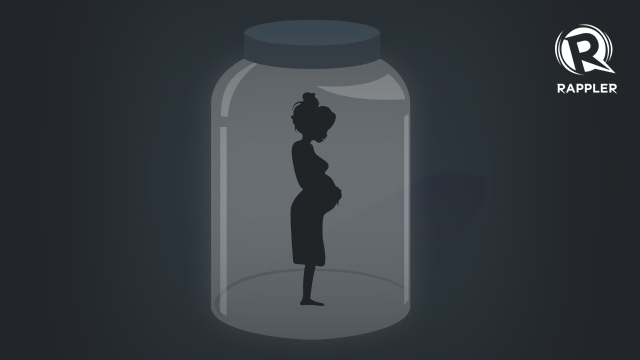SUMMARY
This is AI generated summarization, which may have errors. For context, always refer to the full article.

MANILA, Philippines – Savita Halappanavar and her husband Praveen must have been like any other infanticipating couple, thrilled at the prospect of becoming parents.
Tragically, that will never become a reality.
Savita, 31, died of blood poisoning after she was denied an abortion while she was miscarrying. Doctors in Galway, Ireland, where the couple was living, said they were a Catholic country and could not perform an abortion while there was still a fetal heartbeat.
Accounts by her husband indicate that Savita, who was 17 weeks pregnant with their first child, was brought to the hospital on October 21 after experiencing severe pain. Doctors’ diagnosis indicated that Savita had started miscarrying.
The couple’s requests for a medical termination were refused because the fetal heartbeat was still present. According to Praveen, they were told, “This is a Catholic country.”
The couple is neither Catholic nor Irish.
The fetus did not survive and Savita was placed in intensive care after to surgically remove its remains. But it was too late. Savita was pronounced dead on October 28 after what Praveen describes as a protracted, agonizing death. Cause of death was blood poisoning.
(Read more of Praveen’s account of Savita’s condition here.)
Indignation
Public outrage swept through Galway and Dublin. Thousands have staged indignation rallies and vigils. Reports say that many of the marchers are mothers and daughters chanting, “Never again!” while holding pictures of Savita.
Candlelight vigils have also been held in London and in Washington, DC outside the Irish embassy.
Savita’s parents say that she would not have died if she were in her home country, India, where abortion is allowed under certain conditions.
The Medical Termination of Pregnancy (MTP) Act of India clearly states the reasons why an abortion may be medically terminated.
Banning doesn’t make it go away
Much like in Ireland, in the Philippines, abortion is illegal.
But it doesn’t mean abortion doesn’t happen. It only means it happens even more. According to US-based reproductive health research organization, Guttmacher Institute, in 2008, there were over 500,000 cases of abortion in the Philippines every year and about 1,000 deaths due to abortion-related complications.
Maternal deaths — which is highly preventable — account for about 12%-14% of all women’s deaths in the country.
I once interviewed a community woman from Malabon who underwent an abortion. She said she didn’t feel guilty about what she did. It was, in a way, an act of mercy.
(Read more of the story of this woman and other women who have undergone abortions in the Philippines here.)
In the vernacular, she told me, “I would have felt more guilty having to go through each day with nothing to feed this child.”
She, like many other women, resorted to buying Cytotec to induce abortion. She suffered intense bleeding and was brought to the hospital.
She told me how she was humiliated by the doctor who checked her condition. “Nagpalaglag ka kaya ka nagkaganyan,” she was told. (You tried to have an abortion. That’s why that happened to you.)
The doctor treated her (others outright refused) but did not call her by her name, referring to her only as “Ms Abortionist.”
I asked her if this made her angry. “Nanliit na po ako.” (It made me feel small.)
I asked her if she complained or showed her anger. “Hindi po. Kayo po, siguro pwede magalit. Ako…” (No, I didn’t complain. You can complain, but I cannot…”)
Her voice trailed off and she did not complete her sentence.
Class divide
Why is it that we don’t hear about middle-class women suffering from complications brought about by failed abortion attempts?
Ben de Leon, president of Forum for Family Planning, and I were having this conversation the other day and we both came to the same conclusion.
Just because we don’t hear of middle-class women having an abortion doesn’t mean they don’t have them. They just have them secretly.
Those who have the means go to Hong Kong or Singapore to get the procedure. They come back from their “shopping trip” as if nothing happened.
Medically accepted reasons for abortion
There are medically accepted reasons, or exceptions, for an abortion to save a woman’s life. Examples when therapeutic abortion may be justified:
1. ectopic pregnancy
2. use of chemotherapy
3. fetal impairment, e.g. anencephaly
4. eclampsia or malignant hypertension
5. molar pregnancy
But under the law (Revised Penal Code of 1930), doctors in the Philippines may still not perform abortion in the above cases. They run the risk of losing their medical licenses. Women who undergo abortion are also subject to imprisonment.
This law is a direct translation of the Spanish Penal Code of 1870 and has not been changed since pre-colonial times.
Lawmakers are moving to extend this period of imprisonment even further under House Bill 3667.
It is a punitive approach to the problem; one that evokes punishment rather than prevention.
The current situation and the blatant disregard for women’s sexual health rights is entrapment. With no access to information about reproductive health, no means to purchase services, women are backed up against the wall, left with no options and only mouths to feed.
Sometimes their decisions, made out of desperation, cost them their life.
But why are there no indignation rallies for these women? – Rappler.com
Add a comment
How does this make you feel?
There are no comments yet. Add your comment to start the conversation.